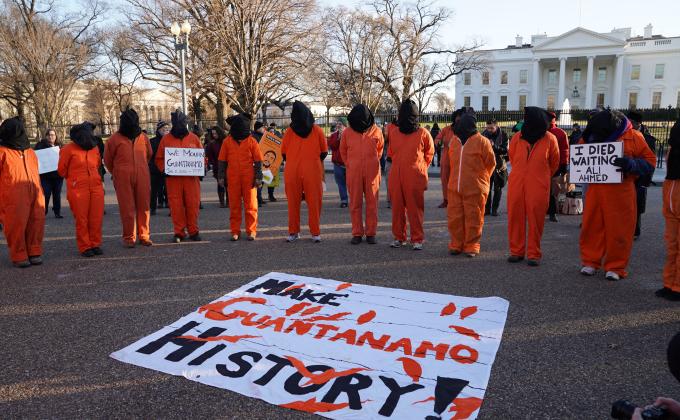It took nine years, before Khaled El-Masri, a German national of Lebanese origin, saw justice done. On 31 December 2003, El-Masri was illegally detained by Macedonian border guards, on suspicion of being an al Qaeda operative. After 23 days he was transferred to Central Intelligence Agency (CIA) agents and was subsequently taken to Afghanistan. After enduring torture and abuse, he was set free several months later, after the CIA realised it was a case of mistaken identity and El-Masri was not the terrorist they took him for. On 13 December 2012, in a landmark judgement, the European Court of Human Rights found that the Republic of Macedonia is liable for its involvement in the CIA’s extra-ordinary rendition programme. Specifically, the Court ruled that Macedonia is responsible for the inhuman and degrading treatment El-Masri suffered during the time he was held incommunicado by the Macedonian authorities.
In addition, Macedonia was also found responsible for the torture he endured at the hands of the CIA when held at Skopje airport before he was transported to Afghanistan in 2004. This conclusion was derived from the presence of Macedonian officials during these acts and the fact that torture was conducted within Macedonia’s jurisdiction. The Court confirmed "that even in the most difficult circumstances, such as the fight against terrorism and organised crime, the Convention prohibits in absolute terms torture and inhuman or degrading treatment or punishment irrespective of the conduct of the person concerned". (Par. 195) It further argued that "the respondent states must be regarded as responsible under the Convention for acts performed by foreign officials on its territory with the acquiescence or connivance of its authorities". (par. 206). These statements are well rooted in public international law. It is, however, the first time that they have been applied to a case of extra-ordinary rendition, and that a State was subsequently attributed responsibility and accountability for these actions.
Additionally, the Court also found that Macedonia knowingly subjected El-Masri to the real risk of being exposed to torture by handing him to the CIA for transportation to Afghanistan. The Court opined that there was already sufficient material and information in the public domain at the time of El-Masri’s removal to Afghanistan that provided reliable information about the practices of the CIA, so-called “black sites”, and the illegal interrogation methods used. Therefore, the Macedonian authorities could have assessed the risk that they would subject El-Masri to prior to his rendition. In addition, Macedonia did not even try to seek any assurances from the US authorities to avert the risk of ill-treatment.
Furthermore, after El-Masri was set free and had filed a criminal complaint against the responsible Macedonian officials involved in his ill-treatment in 2008, Macedonia failed to thoroughly investigate the facts and allegations submitted. The prosecutor ruled on the sole basis of the papers submitted by the country’s Ministry of the Interior, and concluded that in the absence of any evidence contradicting the Ministry’s conclusions, further investigatory measures were not necessary. The European Court concluded that Macedonia had also violated its obligation to "secure to everyone within [its] jurisdiction the rights and freedoms defined in (…) [the] Convention", which implies that there should be an effective official investigation. (par. 182) The Court held that "an adequate response by the authorities in investigating allegations of serious human rights violations, as in the present case, may generally be regarded as essential in maintaining public confidence in their adherence to the rule of law and in preventing any appearance of collusion in or tolerance of unlawful acts". (par. 192) This is a very important conclusion: although it is a welcome development that an international judicial body finally speaks out about the illegality of the extra-ordinary rendition practices and inhuman treatment of those transported, this can only be the third line of defence against these practices. The first line, after all, is the absolute prevention of these practices taking place; the second line of defence should be the thorough domestic investigation undertaken in response to allegations being made.
Success in this case, came after multiple attempts to find justice. In 2005, for instance, the American Civil Liberties Union (ACLU), filed a lawsuit before the United States District Court for the Eastern District of Virginia, on behalf of Mr El-Masri, against inter alia the former CIA director George Tenet. This lawsuit was rejected based on the argument that the case involved state secrets, which could not be subject to judicial review. ACLU, in 2008, filed a petition with the Inter-American Commission on Human Rights on El-Masri’s behalf but to date, the US government has declined to file a response. In 2007, the German prosecutor, issued international arrest warrants against the CIA agents involved in the rendition of the German national. However, due to American pressure, the German government did not file an official extradition request to the US. Although in 2009 the German parliament conducted an investigation into the case, and concluded that the allegations made by El-Masri were credible, and the official account of the Macedonian government was "clearly incorrect".
Meanwhile, Dick Marty, who was appointed as a rapporteur for the Parliamentary Assembly of the Council of Europe (PACE), issued two reports in 2006 and 2007, making allegations against several European states for cooperation with the CIA rendition programme and for the black sites, which where hosted by Poland and Romania between 2003 and 2005. Also, the European Parliament started an inquiry in 2006, chaired by EP member Fava, and concluded that the CIA had conducted more than a thousand flights through European airspace. The report was followed by a second in 2012, chaired by EP member Flautre, in which EU Member States were again called upon to start investigations into the alleged practices within their territories.
The judgement by the European Court in this case could have an important effect in current and future (civil) claims filed by individuals who have been the victim of CIA rendition programmes with the assistance of European states. Unfortunately, many cases are still being settled outside the court room, circumventing full transparency and attribution of accountability for these actions. This also happened with the Al-Saadi case against the UK, which was settled on 13 December for £ 2.2 million. The settlement was made possible because the British authorities wanted to prevent any intelligence information from being subjected to judicial review.
Another timely and interesting coincidence is the approval on the same date of a 6,000-page highly critical, but a classified report by the US Senate Intelligence Committee on the CIA’s detention and interrogation programme. According to the Democratic chairwoman Senator Dianne Feinstein, the report uncovers ‘startling details about the CIA detention and interrogation programme and raises critical questions about intelligence operations and oversight’. The report details the custody and treatment of each of the detainees held in CIA custody, and also includes details on the accuracy of the information that was provided about these programmes to the White House, Department of Justice, Congress and others. After a first round of consultations, the Senate committee will vote again in February 2013 on how much of the report should be declassified. It is highly likely that any further declassification (or a Wikileaks-style coup), will bring along a new wave of (civil) claims against these governments practices. After all, the final word in the battle against impunity has not yet been spoken.








